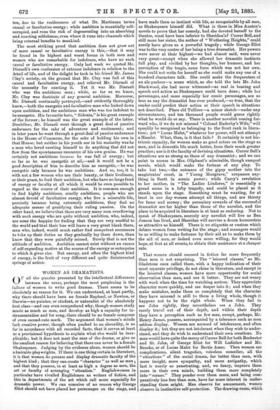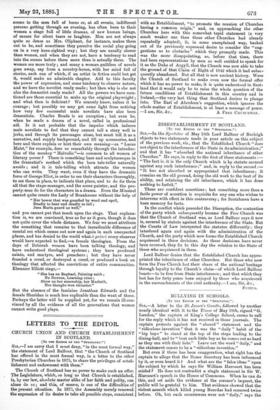WOMEN AS DRAMATISTS.
1' all the puzzles presented by the intellectual differences
between the sexes, perhaps the most perplexing is the failure of ,Nomen to write good dramas. There seems to be absolutely no reason for it. We can understand, at least partly, why there should have been no female Raphael, or Newton, or Darwin—no painter, or student, or naturalist of the absolutely first class—and can even comprehend why, though women study music as much as men, and develop as high a capacity for instrumentation and for song, there should be no female composer of even second-rate mark. The argument that women's minds lack creative power, though often pushed to an absurdity, is so far in accordance with all recorded facts, that it serves at least as a provisional hypothesis to explain what else would be inexplicable; but it does not meet the case of the drama, or give us the smallest reason for believing that there can never be a female Shakespeare. Judging by the evidence alone, women should be admirable playwrights. If there is one thing certain in literature, it is that women do possess and display dramatic faculty of the highest kind ; that they can create " character " as well as men ; and that they possess, in at least as high a degree as men, the art or faculty of arranging " situation." Englishwomen in particular have rivalled Englishmen as writers of fiction, and this in departments of the art which call more especially for dramatic power. We can conceive of no reason why George Eliot should not have placed her personages on the stage, and have made them as instinct with life, as recognisable by all men, as Shakespeare himself did. What is there in Miss Austen's novels to prove that her comedy, had she devoted herself to the theatre, must have been inferior to Sheridan's? Currer Bell, and still more her sister, the author of " Wuthering Heights," could surely have given us a powerful tragedy ; while George Eliot was to the very centre of her being a true dramatist. Her powers were never at their highest—we had almost said, were never very great—except when she allowed her dramatic instincts full play, and vivified by her thoughts, her humour, and her perception of the tragic, some form which was not her own. She could not write for herself as she could make any one of a hundred characters talk. She could make the frequenters of an ale•parlour—a scene which, as she told the late Mr. John Blackwood, she had never witnessed—as real in bearing and speech and action as Shakespeare could have done ; while her personages, and more especially her comic personages, are as true as any the dramatist has ever produced,—so true, that the reader could predict their action or their speech in situations not described. Place old Tulliver—a minor sketch—under any circumstances, and ten thousand people would guess rightly what he would do or say. There is another novelist coming forward who, if we do not misread " Colonel Enderby's Wife," will speedily be recognised as belonging to the front rank in literature; yet "Lucas Malet," whatever her power, will not attempt a Hamlet. What, then, is it that fails ? It certainly is not histrionic capacity, for women make as good actors on the stage as men, and in domestic life much better, from their much greater practice ; nor is it the faculty of devising situations. Currer Bell's situations are as strong as those of any dramatist; and we can point to scenes in Mrs. Oliphant's admirable, though unequal novels, which would make the fortune of any play. To take but two,—the entrance of the gipsy mother into the magistrates' court, in " Young Musgrave," surpasses anything in Scott in scenic power; while Carry's revelation to her mother, in " The Ladies Lindores," is essentially a grand scene in a lofty tragedy, and could be placed as it stands upon the stage. Something must be wanting, for at least in our day women attempt all things, and are thirsty for fame and money ; the pecuniary rewards of the successful dramatist are far higher than those of the novelist, and the place to be acquired in literature is at least as enduring. Not to speak of Shakespeare, scarcely any novelist will live as Ben Ronson has lived, and Sheridan will survive a dozen humourists as attractive as himself. There is no etiquette or custom which debars women from writing for the stage ; and managers would be as willing to make fortunes by their aid as to make them by the aid of men, or indeed even more willing, for they would hope, at first at all events, to obtain their assistance at a cheaper rate.
That women should succeed in fiction far more frequently than men is not surprising. The " leisured classes," as Mr. Gladstone once called them, with a happy indication of their most separate privilege, do not shine in literature, and except in the leisured classes, women have more opportunity for social observation than men, and use it better. They are not weary with work when the time for watching arrives. They appreciate character more quickly, and see deeper into it ; and when they make mistakes, make them so completely that the character they have misread is still to them a living whole, though it happens not to be the right whole. When they fail to see John rightly, they nevertheless see a John. They rarely travel out of their depth, and within their depth they have a perception such as few men, except, perhaps, Mr. Henry James, possess, accompanied by a tolerance such as men seldom display. Women are accused of intolerance, and often display it ; but they are not intolerant when they wish to understand, and they do wish to understand their own creations. No man would have quite the mercy of Currer Bell for both Rochester and St. John, of George Eliot for Will Ladislaw and Mr. Brooke, or of Lucas Malet for Bertie Ames. Then women see complications, silent tragedies, voiceless comedies, all the " situations " of the -social drama, far better than men, with more insight, more sympathy, and more antipathy, which last is nearly as penetrating, and, we fancy, improve them more in their own minds, building them more completely into " scenes." They ponder over them more, and being comparatively less free than men, have far more interest in understanding them aright. Men observe for amusement, women observe in instinctive self-protection. The drawing-room, which
seems to the men full of bores or, at all events, indifferent persons getting through an evening, has often been to their women a stage full of little dramas, of new human beings, of causes for silent tears or laughter. Men are not always quite so dense as Mrs. Oliphant, for instance, makes them out to be, and sometimes they perceive the social play going on in a very keen-sighted way; but they are usually slower than women, and when they are not, have a tendency to read into the scenes before them more than is actually there. The women see more truly ; and many a woman guiltless of novels
goes away, say from a country-house, with her mind full of stories, each one of which, if an artist in fiction could but get
it, would make an admirable chapter. Add to this faculty the power of expression, and some tendency to observe nature, and we have the novelist ready made ; but then why is she not also the dramatist ready made? All the powers we have mentioned are those essential to make up the original playwright ; and what then is deficient? We scarcely know, unless it be courage ; but possibly we may get some light from noticing how very few successful male novelists have also been dramatists. Charles Reade is an exception ; but even he, when he made a drama of a novel, called in professional aid. Is it not probable that the impulse which induces male novelists to feel that they cannot tell a story well in jerks, and through its personages alone, but must tell it as a narrative, and supply background, and fill up accessories, and here and there explain or hint their own meaning—as " Lucas Malet," for example, does so remarkably through the introduction of the monkey " Malvolio "—is common to all women of literary power P There is something bare and sculpturesque in the dramatist's method which the born tale-teller naturally avoids ; and it is tale-telling which attracts the women who can write. They want, even if they have the dramatic force of George Eliot, in order to see their characters thoroughly, to see them in place, to indicate that place, and to do for them all that the stage-manager, and the scene-painter, and the pro perty-man do for the characters in a drama. Even the Minstrel cannot quite create the Lady of Branksome without the help of
" Her bower that was guarded by word and spell, Deadly to hear and deadly to tell ; Jean Maria guard us well,"
and you cannot put that touch upon the stage. That explanation is, we are convinced, true as far as it goes, though it does not quite cover the whole distance. We fear we must attribute the something that remains to that ineradicable difference of mental sex which comes out now and again in such unexpected
places, and has denied to the world what a priori every observer would have expected to find,—a female theologian. From the clays of Deborah women have been tailing theology, and have understood theological systems ; they have produced saints, and martyrs, and preachers ; but they have never
founded a creed, or destroyed a creed, or produced a book on theology that affected the convictions of entire communities. Ebenezer Elliott sings,
" She has no Raphael, Painting saith ; No Newton, Learning cries ;
Show us her steamship, her Macbeth, Her thought-won victories."
But the absence of the feminine Jonathan Edwards and the female Sheridan is much less explicable than the want of these. Perhaps the latter will be supplied yet, for we remain ill-convinced by all the evidence of all the generations that women cannot write good plays.



































 Previous page
Previous page